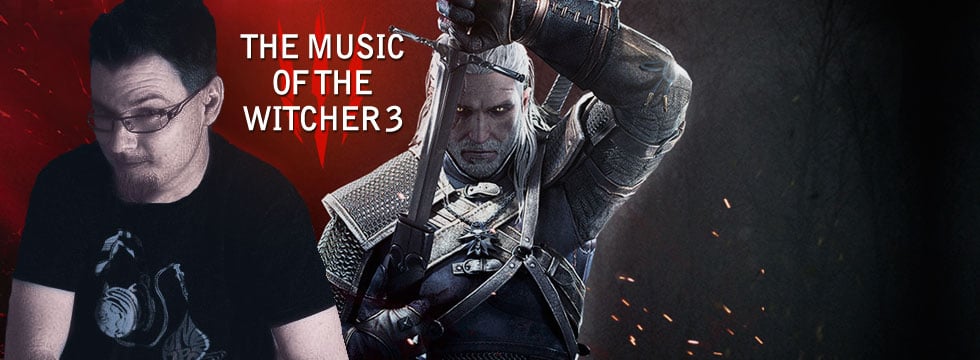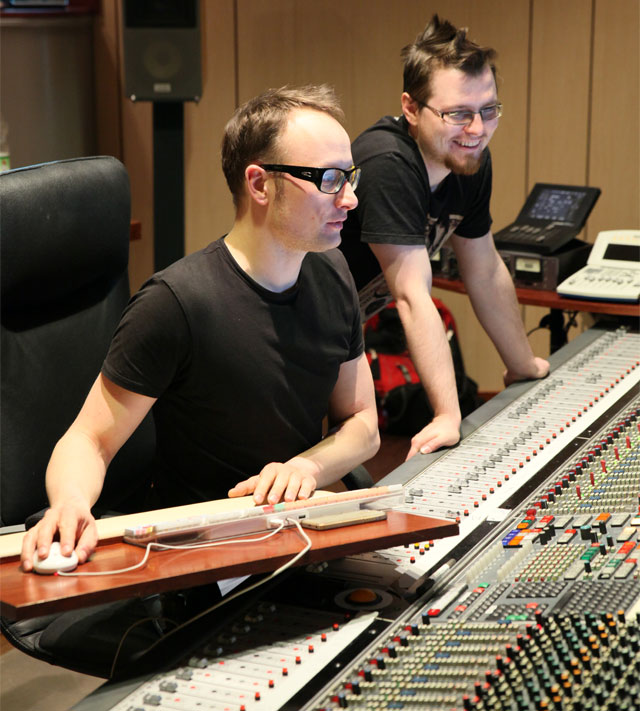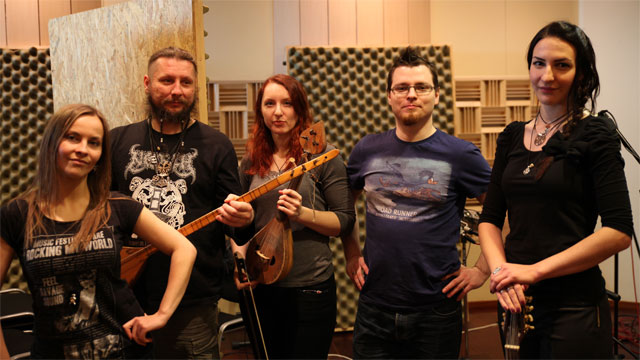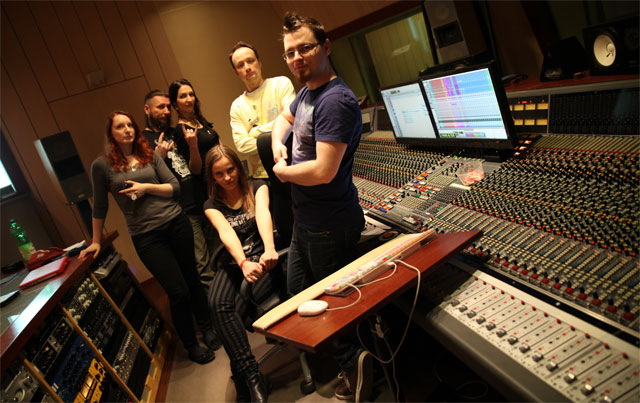"We don’t define folk" Says The Witcher 3: Wild Hunt Composer
Composer of the music for The Witcher 3: Wild Hunt found a few moments to take us behind the scenes of the game’s soundtrack creation process. Marcin Przybylowicz talks about, inter alia, Slavic themes and cooperation with Percival band.

So far we know quite a lot about the third installment of The Witcher series, however, we haven’t put enough attention on its musical setting. We decided to correct that mistake and take you behind the scenes of the soundtrack creation process, especially that it really is impressive. Marcin Przybylowicz, the person responsible for that very aspect of the next game from CD Projekt RED, helped expand our knowledge of the matter. We also asked him, among other things, what folk themes inspired the musicians as well as what lead to parting ways with Gene Rozenberg.
Krystian Smoszna: A couple of famous Polish composers worked on The Witcher series. Krzysztof Wierzynkiewicz, Adam Skorupa, Pawel Blaszczak. Why the shift in the lead composer position?
Marcin Przybylowicz: It’s hard for me to tell what was going on before I joined CD Projekt RED. Of course, the music from the first Witcher was made by Adam Skorupa and Pawel Blaszczak, but not only them. Not many people know that additional music was created by Krzysztof Wierzynkiewicz, whereas The Witcher 2 composing works was captained by Adam Skorupa and Krzysztof Wierzynkiewicz, with my humble share.
How did it happen that it was you who got that honor this time?
At the beginning of the concept stage of the works on The Witcher 3, the game director offered me the role of the lead composer, and obviously I agreed, and ever since I’ve been trying to do my best.
The Witcher 3 is definitely the biggest project in your career, in terms of scale. How different is your current job from what you were doing previously?
Quite much. I work on the new Witcher at CD Projekt RED bureau, so it’s a stationary job. That’s the first difference – before that I did most of my jobs as a freelancer. The very fact of working at a studio, dealing with the game daily, and the nature of my responsibilities results in much diversity as compared with my previous projects. I am responsible for the music in The Witcher 3 as a whole, starting with designing the music system that gives direction to the entire soundtrack, through forming the tone and musical style of the game, composing and implementing the music, and finally managing the whole process. Yes, this is by far the biggest and the most complex project I have ever worked on.
How long have you been working on the soundtrack for The Witcher?
Actually, we’ve been doing that since the initial works on the third game started, so from the very beginning.
Have you finished by now?
No. It’s still work in progress. Making music for such a complex game is a multistage process, so it takes a while.

A big crew working on the project. You, Mikolaj Stroinski, Gene Rozenberg. How does the division of labor look like?
Gene used to lead the audio team and helped us with great deal of things, such as composing music for example, but we parted ways a while ago. After some consultation, we concluded that although cool, his compositions didn’t fit the game’s atmosphere. As for the division of labor, it’s quite simple. Like I said, I am responsible for the musical concept as a whole and the way it relates with the game director’s vision, implementing the music, managing the outsourcing, and music directing during recording sessions. Besides, the music itself has to be composed – and that’s what I do together with Mikolaj.
Isn’t Mikolaj staying in the USA a problem?
In the era of universal internet connection distance is not a problem, however, different time zones we are living in make a certain difficulty. Mikolaj is living in Los Angeles, so there are nine hours of difference between us – at the time when it’s almost 6 PM here, Mikolaj is just having his breakfast. Fortunately though, I am a night owl, so we manage to find proper time for conversations and sharing information despite the obvious delay in time – it’s mostly about organization.
Involving Percival band really hit the spot.
Thanks, I’m really glad people reacted so positively to the announcement of the partnership.
How did that partnership begin?
I don’t think there is any exciting story to that. During the pre-production stage of the game we decided that the music in the new Witcher should go back to the roots and try to relate to the themes and the character that was so excellently captured by Adam Skorupa and Pawel Blaszczak in the first game – fans still remember that, so it was obvious that The Witcher 3 had to sound folk, Slavic etc. Part of our reference catalogue was Percival’s music. At one point we came at the conclusion that instead of treating them as a reference point we should simply invite them to cooperate with us, after all they are experts in their field.

How big is Percival’s involvement in the music creation?
It depends on what you call the music – if we considered only the pieces written specially for the game, that would be rather small, although not nominal. The band composed a dozen or so new tracks. If these were to be taken as material for their new album, that would probably make a reasonable long play, however, in the context of the new Witcher – which is a really big game – that amount of music is not very impressive.
If, however, we considered a few other things, we would get a slightly different picture – we have access to the complete discography of Percival’s folk music and we are using their existing works whenever we decide that one track or another would sound good in a given moment in the game. Then we rearrange and remake each of these tracks, so, on the one hand, it sounded more powerful and more full, and on the other, that it fit well in the rest of the music we have composed. Consistency of the soundtrack is really important for us and we pay a lot of attention to that. Anyway, fans already got a taste of how it works in action – in Sword of Destiny trailer you can hear a fragment of Sargon track from Oj Dido album recorded a couple of years ago, which sounded much differently in the original version.
We also shouldn’t forget about another vital aspect of Percival’s involvement – we are after two several-day recording sessions, when the band recorded, among other things, main themes of the game. Actually, I must admit that we squeezed every last drop out of them and we have a lot of cool material.
Have you been using some unusual, long-forgotten instruments?
I think in the case of this kind of bands it is not very surprising, but yes – when you look from a certain perspective – that may be impressive.
I don’t know about Percival, but Norwegian Wardruna makes them on their own.
It’s similar in Percival’s case. I believe that the strong point of this type of bands is, among other things, the sound, which is not only achieved with the hard work done in a recording studio, but also thanks to all the exotic, at least for modern-day audience, instruments, which you wouldn’t buy at an average music store. While recording music for the new Witcher, we captured some of these specimens – take the Byzantine lyra, the long-necked lute, or the davul.
I’ve heard that Percival gave a closed concert for the studio’s employees, was that so?
That’s right.
What were the reactions?
The team were delighted. It was really nice to see a combination of surprise and excitement coming off basically everyone present. Percival playing live is a very energetic band and easily makes contact with the audience. I think that we managed to capture at least part of that vividness in the music we’ve composed. I hope that players will feel what we felt (and more) during that concert.
Where do you look for inspirations for the The Witcher’s music?
Our inspiration/reference database is set on several pillars. The first one is of course folk music from various latitudes – we draw from Slavic character of Central and Eastern Europe (thus we have folk from Poland, Ukraine, Russia, etc.), Celtic culture, Scottish (e.g. in Fields of Ard Skelling we used the melody of the nineteenth-century song Fear a' Bhata), or Scandinavian.
The second pillar is popular culture – e.g. popular TV shows, historical or fantasy films. The Witcher has become a recognizable brand and exists as such in mass culture. We take that under account, because we care that the audience, especially the Western, was willing and able to identify with Geralt and his universe, which after all has a character of its own and stands out from the Post-Tolkien fantasy genre.
Finally, the third pillar is the music from the previous The Witcher games. The third one closes the trilogy, so it’s obvious for me that the music accompanying Geralt’s new adventures should, to a degree, continue and develop what we could hear in the previous installments. That’s why we decided to make the well-liked main theme from the first game central also for The Witcher 3. We’re going back to where all this started. We want to use that theme as a staple that binds the entire trilogy.
To be honest, the tracks you have presented so far are much different from other fantasy productions. Where does their unique character come from?
Thank you, I’m really pleased to hear that. I think that the power of the soundtrack springs from several sources. A vital aspect of the music is its folk or folk-inspired element that I try to expose, because I believe it is this musical palette that is best able to reflect the harshness of The Witcher’s universe, and on the other hand, it conveys that primal joy and feistiness characterizing our folk.

But that’s not all. The music in the third game does not try to define folk, which is rather a source of borrowings and style. The foundation on which we set these accents, is illustrative music, which has a specific role to play in the game – enhance the narrative and evoke particular emotions in the audience. It’s possible that the combination of the two factors gives that fresh, attractive vibe to the whole. Another thing is the character of the world known the books written by Sapkowski. It is not a typical fantasy story with dragons and beautiful elves. This asset too influences the perception of the music as such.
How much music are we going to hear in the third Witcher?
It’s hard to give a specific amount, because the music is still being produced. It will definitely be a couple of hours, more than in the previous Witchers.
Is there a chance to release the complete soundtrack, in addition to selected tracks that will be included in the standard and collector’s edition of the game?
I cannot answer that question right now; the matter of soundtracks is still open, we are working on that.